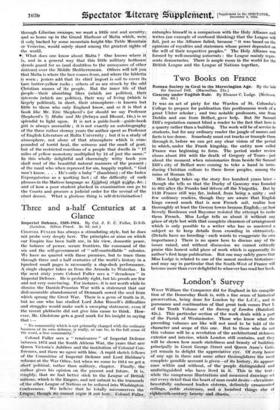Three and a-half Centuries at a
Glance
Imperial Defence, 1588-1914. By Col. J. F. 0.:•Fuller, D.S.O. (London. Sifton Praed. 3s. Cyd. net.) COLONEL. FULLER has always a stimulating style, but he does not probe very deeply here. The principles or aims on which oar Empire has been built are, in his view, domestic peace, the balance of power, secure frontiers, the command of the sea and the self-government of " self-controllable " colonies. We have no quarrel with these premises, but to trace them through three and a half centuries of the world's history in a hundred small pages is necessarily a slap-dash performance. A single chapter takes us from the Armada to Waterloo. In the next sixty years Colonel troller sees a " decadence " in Imperial Defence. He is probably right, but his proofs are few and not very convincing. For instance, it is not worth while to dfsmiss the Danish-Prussian War with a statement that our dishonOurable abandonment of Denmark sowed the seed froin which sprung the Great War. There is a germ of truth in it, but no one who has studied Lord John Russell's difficulties and struggles would make such a sweeping statement, even if the recent plebiscite did not give him cause to think. How- ever, Mr. Gladstone gets a good mark for his insight in saying that :—
" No community which is not primarily charged with the ordinary business of its own defence, is really, or can be, in the full sense of tile word, a free community."
Colonel Fuller sees a " renaissance " of Imperial Defence between 1875 and the South African War, the years that saw Queen Victoria's Jubilees and the institution of Colonial Con- ferences, and there we agree with him. A rapid sketch follows of the Committee of Imperial Defence and Lord Haldane's reforma at the War Office, but when we come to 1914 we get a short 'political, rather than military, chapter. Finally, the author gives his opinion on the present and future. It is, roughly, that we had better stick to the ,League'-of British nations, which is the Empire, and not submit to the trammels of-the other League of Nations or he seduced into Washington Conferences. We believe that he totally misconceives the lAigue, though we cannot argue it out here. Colonel Fuller,
entangles himself in a comparison with the Holy Alliance and ;writes (an example of confused thinking) that the League will fail, just as the Alliance failed, because " it was based on the opiniona of royalties and state-amen *hose power depended on the will of their respective peoples." The Holy Alliance was formed by well-meaning autocrats : the League mainly repre- sents democracies: There is ample room in the world for the BHtish League add the League of Nitions together.






























































 Previous page
Previous page